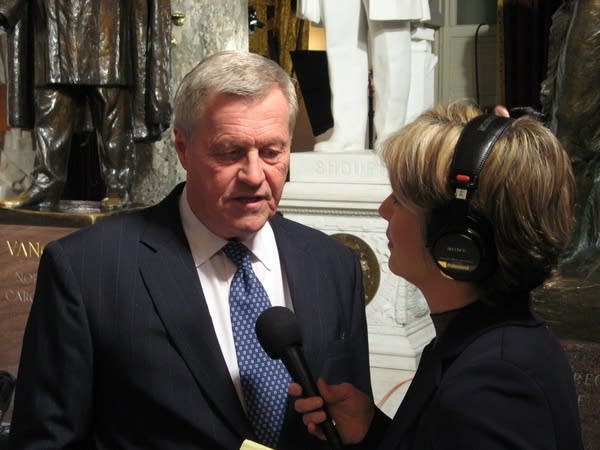Climate bill still faces tough road, despite Peterson's support
Go Deeper.
Create an account or log in to save stories.
Like this?
Thanks for liking this story! We have added it to a list of your favorite stories.

A national climate bill took a big step forward today when U.S. Rep. Collin Peterson of Minnesota announced a deal on agricultural issues in the package.
But the legislation still faces plenty of hurdles on its way to final passage. Not all farm groups support it, and some environmental organizations say the deal that was struck is weakening the bill.
The bill creates what's known as a cap and trade system to reduce carbon emissions and slow global warming. Peterson, who chairs the House Agriculture Committee, had threatened to block the bill unless farm concerns were met.
After more than two weeks of negotiations with the authors of the bill, Peterson says he got what he wants.
Turn Up Your Support
MPR News helps you turn down the noise and build shared understanding. Turn up your support for this public resource and keep trusted journalism accessible to all.
"We think that we have something here now that can work for agriculture," said Peterson.
The deal includes a key concession on ethanol, which has has to do with how much greenhouse gas the ethanol industry emits.
Originally, Congress had said that tally must include changes in agriculture across the globe caused by growing corn for ethanol.
[image]
For example, if new land is plowed in South America to grow corn, to replace grain lost to ethanol, the greenhouse gases emitted during that process would have had to be measured and added to the ethanol tally.
If the ethanol emissions were too high, it would have threatened federal subsidies for the industry.
Peterson says the deal prohibits those worldwide impacts from being assigned to ethanol, while a multi-year study is done on the issue.
"Nothing can happen for six years, and we thought that was acceptable," said Peterson.
A second part of the deal would give farmers more paybacks for management practices which reduce greenhouse gases. These practices include leaving more surface crop residue to lock carbon in the soil, or planting trees to absorb carbon from the air.
But even with the changes, not all farm groups support the legislation. The American Farm Bureau applauded Peterson's efforts, but said the bill is still flawed. The group fears it will raise the cost of energy and hurt U.S. farmers on world grain markets.
William Yeatman with the Competitive Enterprise Institute in Washington, which opposes the bill, says those sorts of concerns are still widespread in the House.
"For freshman Democrats, for moderate Democrats, this is a dangerous vote," he said.
Yeatman says if it turns out the legislation increases energy prices, anyone supporting the measure could pay a price at election time.
Yeatman says it could be an especially difficult vote for Democrats from energy producing states, especially coal states. He says by creating a market system to sell greenhouse gas credits, the legislation will put a price on emissions and affect coal-producing states the most.
"It will have an uneven geographic impact," said Yeatman. "It's going to hurt states that rely upon hydrocarbons more than it will hurt states that rely less upon hydrocarbons."
The future of the bill is cloudy for another reason. Environmental groups are concerned about the sorts of deals being cut to win votes in Congress, such as the one Collin Peterson worked out for agriculture.
A coalition of environmental groups, including Greenpeace and Friends of the Earth, now oppose the measure. They say the deals have weakened the bill so much that it won't cut pollution enough to avoid major climate change.
Other environmental groups still like the legislation, but want it strengthened.
"It's not a perfect bill," said J. Drake Hamilton, with Minnesota-based Fresh Energy. "Fresh Energy supports the bill in its current form."
Hamilton says her organization would like to see a number of changes to the legislation. One of those is to increase the contribution of renewable energy to the nation's electricity production.
Those are the sorts of concerns that will be debated Friday, when the House is expected to vote on it.
If it passes there, the bill could face a more difficult road in the Senate. There, geographical concerns like agriculture and energy production could be even bigger problems for the legislation.



